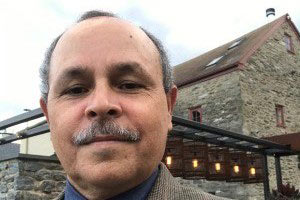Witness while walking: Francisco Javier Goitía Padilla on leadership, faith, service

Church experience for Francisco Javier Goitía Padilla (2014, PhD; 2003, ThM) began early, when his grandmother, a woman of deep faith, took him with her to Roman Catholic services in his hometown in Puerto Rico.
“I’ve been a church mouse all my life,” Goitía Padilla says, laughing. “But I became Lutheran when I was about 10 or 12 years old.” It was then that a mission came to Caguas, Puerto Rico, and Goitía Padilla was first exposed to a church that allowed leaders to marry and have families. This was a future he could envision for himself, and he moved toward it. Soon, Goitía Padilla was invited to Lutheran youth leadership events and was even traveling between Puerto Rico and the United States for leadership formation work.
Goitía Padilla began working toward his MDiv in the early 1990s at the then-Lutheran Theological Seminary in Philadelphia, Pa., (now United Lutheran Seminary). By the time he graduated in 1995, he knew that he wanted to take his studies further; after all, he had a message for people just like him with backgrounds just like his and there were hardly any Lutheran Latinx scholars out there—perhaps five or six. Of this limited cohort, Goitía Padilla knew all but one studied at LSTC.
An easy decision
With the possibility of community at his fingertips, it was an easy decision to come study at LSTC, where Goitía Padilla earned both his ThM in Lutheran hermeneutics and his PhD in systematic theology. It was at LSTC that he worked with such seminal scholars and leaders as José David Rodríguez, the Augustana Heritage Chair of Global Mission and World Christianity. Also from Puerto Rico, Rodriguez was known for his work in systematic theology, another of Goitía Padilla’s key interests.
Goitía Padilla was also excited about studying with the esteemed Brazilian theologian, the late Vitor Westhelle, another professor of systematic theology and a prolific writer known for publishing works in English, German, Portuguese and Spanish. Furthermore, the department boasted experts on faculty like Philip Hefner and Antje Jackelén, both of whom Goitía Padilla admired. These mentors provided the foundation for his own leadership and work in Latinx communities.
“They were not only my mentors, but my friends,” Goitía Padilla says. “And they were very, very intentional in mentoring us and inviting and accompanying us in connecting theology, hermeneutics and the Latinx identity.” For someone like Goitía Padilla, who always aspired to live as a practical theologian actively engaging with parishioners, these were the best possible people to have as he began fulfilling his own leadership potential.
Leadership lived out
Today, he combines administrative and academic work as senior director for formation for leadership in the ELCA and as an adjunct professor at institutions such as Garrett Theological Seminary, McCormick Theological Seminary and Seminario Evangélico de Puerto Rico. He also works with Latinx congregations in Chicago.
Goitía Padilla believes Lutheran systematics and hermeneutical endeavors connect well to the Latinx experience: “The experience of being Latinx in the United States … is one of [the] opportunities in the midst of political, social, and personal dilemmas and difficulties. And yet as we endure these difficulties, we can also party, have a fiesta. Fiestas are opportunities to celebrate even when you and your community undergo pain. That kind of life, that goes back and forth from penas to fiesta, from suffering to celebration, is portrayed in the gospel and articulated in the Lutheran dialectics of law and gospel. … It resonates well with the way in which our Latinx communities see and [experience] life.”
At the nexus of pain and possibility lies hope and the chance to connect with the divine. “God reveals God’s self in unexpected places, in the places nobody looks, in the places discarded by society,” Goitía Padilla says. “You find God there—at the cross. For us [in the Latinx community] wrestling with immigration, race, dealing with opportunities and dilemmas of urban cities, we can make sure and proclaim hope in the sense that it is in our darkest places that Christ can come and be with us.”
A distinguished alum
It’s no surprise that Goitía Padilla has been honored with the “Called to Lead” Distinguished Alumni Award that he’ll receive at LSTC’s Homecoming in October. He offers a message of hope in his academic work and his ministry that transcends individualized despair and yet recognizes suffering as an integral component of humanity and society itself.
“I’ve been wrestling with what leadership means,” Goitía Padilla says, acknowledging that he never saw himself as a kind of leader who deserved accolades. “But my understanding is that leadership means ‘witnessing-while-walking.’ That is, be a witness to Christ while walking the walk of ministry.”
It isn’t always easy, in the witnessing or the walking. After Hurricane Maria, he saw soul-tiredness in his students who traveled great distances, worked multiple jobs, and still showed up prepared for their coursework. He was serving as academic dean at the Evangelical Seminary in San Juan, Puerto Rico, at the time. Or the pain he experienced when working in Dorado, Puerto Rico, with a Pentecostal pastor named Ezekiel—a sanitation worker by day—who tirelessly advocated for his people’s right to remain on government land that had become their home.
Goitía Padilla sees that same fatigue and that same commitment in many of his students today—a translucent reminder of just how many people there are who dedicate their life to ministry, no matter the cost. The walking—well, he says with a chuckle, “I’m always behind! Bi-vocational vocations are very difficult … but it’s worth it.”
Goitía Padilla invites others to walk with him: “The purpose of my ministry is to show people that Christ is accessible, Christ is with us, and that hope is something we can trust.”
By Rhiannon Koehler, a writer, editor and content director in Chicago.